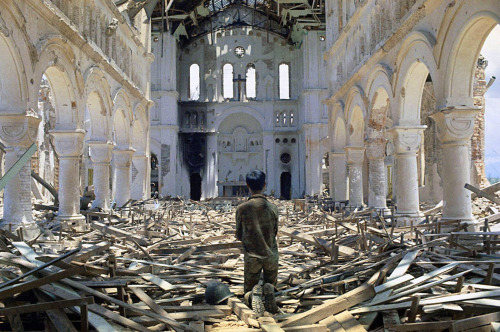The monastery ain’t a hideout. A mug wants to come in here, take the vows, he should come because he wants to open himself to somethin’ bigger than the world, not because he wants to close himself up in a little ball like a pill bug.
– Dean Koontz, Brother OddFor me prayer is a surge of the heart, it is a simple look towards Heaven, it is a cry of recognition and of love, embracing both trial and joy.
– St. Thérèse of Lisieux
A friend of mine who converted from atheism was flummoxed when I shared my anxiety about a curse on my family. Coming from an entirely rationalistic background, he did not believe in the power of curses. Neither did he believe in the power of blessings.
“Blessings are just nice thoughts,” he said. “Prayer is aligning yourself with the Divine Will. You can’t change God’s mind with prayer.”
No, you can’t. But blessings and curses are also means of aligning yourself and others with or against the Divine Will. God permits us to cooperate with Him in the work of salvation, renewing His disordered creation.
Another friend of mine, an Anglican, told me how her mother didn’t understand why I would even have considered entering a convent. “What’s the point of a convent?” The order with which I discerned was semi-contemplative, so we prayed a total of 8 hours a day, including during the washing-up. [I once became distracted praying the rosary aloud while soaping a plate and prayed an “eleventh Hail Mary”.]
What hope do we have when even Christians do not understand the earth-changing power of prayer?
This is one of my favorite saint stories:
St. Kenneth and St. Columba were always close friends. Once, Columba was sailing with some companions and Kenneth was far away in his monastery in Ireland.
Suddenly he became aware that Columba was in great danger at sea. He jumped up from the dinner table and ran to church to pray for his beloved friend.
Out at sea, Columba cried to his frightened companions: “Don’t be afraid! God will listen to Kenneth. Right now he is running to church with only one shoe on to pray for us!” The Lord did listen to St. Kenneth’s prayer and they were saved.
Although Kenneth and Columba often worked in different places, they knew that prayer is a powerful expression of friendship.1
God respects our free will completely, though we are mere dust motes in comparison to Him. Prayer opens us up to God, allowing Him to work marvels in our lives – especially the simple marvel of just going about our daily duties and meeting people, all of whom bear the image of God. Jesus always, always prayed before He acted. He was God Himself! Thus, He most of all understood the importance of prayer in maintaining a deep communion with the other Persons of the Holy Trinity, drawing strength in His human nature from this divine communion so as to do His Father’s will.
The etymology of “prayer” is from the Latin precari, to ask or beg.2 We depend completely on God for our very existence. Prayer is certainly a discipline which attunes us to the will of God. But more than that – as members of the Mystical Body of Christ, we co-operate in God’s salvific action.

God exists outside Time and Space; to Him, all human history is present at once, in His Eternal Now. Therefore, from all time He has been able to take into account our prayers (and the prayers of the saints) while shaping the course of history.
God’s human suffering, the nails, the scourges, the cross; all this is outdone by his suffering as God; the weight of all the sins of all time, of everyone who ever lived. He became sin, became repulsive to the Father for our sake. If he is outside of time, if he is suffering right now, then, and this is really the crux, our sins directly increase His suffering that day on Calvary, his constant suffering. And our virtue can comfort him. This, this, this I believe is the ecstasy of the saints, the blood of the martyrs; that we can comfort our God. That we, by prayer, fasting and virtue can cradle the head of the Lamb. That we, through holiness, can lessen the pain of Our Savior, Our Father, Our Spouse. This concept is radical, yet not new. How many times have you heard, perhaps as a child, “that hurts God”, or “that makes Him sad?” Our faith, the Christian drama, is happening right now, as you read this.
– Marc Barnes, “Holiness, For Christ’s Sake!”
I envision God’s will not as an inflexible iron rod, but as a flowing river, which keeps flowing to the sea, winding around to accommodate obstacles in some places, and breaking through solid rock in others. The path the river takes is an organic interaction of the land and the water. Likewise, in our lives God is always present, sustaining us with His love; He does not bend us out of shape to fit His will if we are unwilling, but gently works away at our hard hearts, although sometimes there may be a blinding moment of rebuke and conversion, as with St. Paul, which completely transforms the landscape of a soul, allowing it to be irrigated by God’s grace.
Life in a monastery is not for wimps. It is as regimented as an army barracks and requires discipline to spring out of bed at morning call; it involves a complete submission of your will to the timetable of the community, hour by hour. You are not free to choose which passage of the Bible to pray each morning, noon and evening; you must follow the Divine Office. Yet, it is in this strict regimen that your soul is freed to meditate upon the Word of God and allow it to transform you, arming you for the battle for souls throughout the world. For we are one in the Mystical Body of Christ, and those who pray in Heaven and on Earth have been given the grace to lift up every other soul on this earth and in Purgatory.
Prayer is abandonment to the holy will of God; it is a seeking after Goodness; it is complete trust in His power to work redemption and healing in the darkest corners of the world. Prayer allows the Kingdom of God to burst in upon this fallen world, bringing light, life, peace and renewed hope through every tribulation.
Ultimately what would fulfill me the most would be to hold the world in my heart and pray for them.
– Erin Wells, “‘Powerhouse of prayer:’ Millennials are drawn to monastic life in Prairie du Sac”For our wrestling is not against flesh and blood; but against principalities and power, against the rulers of the world of this darkness, against the spirits of wickedness in the high places.
– Ephesians 6:12And the smoke of the incense of the prayers of the saints ascended up before God from the hand of the angel.
– Apocalypse (Revelation) 8:4
___
1 “St. Kenneth”, Holy Spirit Interactive.
Image: Signum-Crucis






2 thoughts on “The Efficacy of Prayer: Not Just Nice Thoughts”
“Prayer is a condition set by God Himself in order to obtain graces.” Words of Mary Immaculate to Blessed Father Louis-Édouard Louis Cestac (founder of the Congregation of the Servants of Mary, died in 1868)… Source: http://catholicism.org/a-prayer-to-the-virgin-against-the-spirits-of-darkness.html
Nice article though partly “beautified”. There are times in our lives when praying, thanking God is psychically impossible….the heart aches…and God is silent!